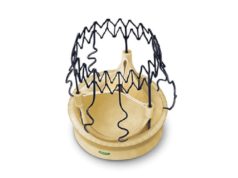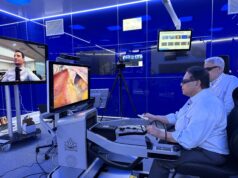Elixir Medical has announced three-year imaging results from the DESolve Nx international pivotal clinical trial for the CE mark-approved, fully bioresorbable DESolve novolimus eluting coronary scaffold system.
Stefan Verheye, ZNA Middleheim Hospital, Antwerp, Belgium, and co-principal investigator of the DESolve Nx trial, presented imaging results of multiple cases from a subset of 14 patients scheduled to be followed up with angiography and optical coherence tomography (OCT) at three years as part of the study.
OCT imaging showed complete bioresorption of the scaffold with only the markers visible to indicate the location of the bioresorbable scaffold. The vessels showed homogeneous light reflectivity on OCT indicating refurbished endoluminal lining and formation of the golden tube within a clinically relevant timeframe.
“I am very pleased to see excellent long-term vascular response and patent vessels in patients with the DESolve scaffold after it is completely resorbed,” said Verheye. “The golden tube formation within three years, inducing plaque regression and the restoration of the vessels to their normal physiologic condition, clearly reinforces the potential of DESolve over other modes of treatment, and expands its potential for evaluation in new clinical indications.”
“Elixir is proud to be the only company in the world that has demonstrated the golden tube visualisation within three years,” said Motasim Sirhan, president and chief executive officer of Elixir Medical. “While the full core lab analysis is currently underway, and the final results will be presented at a future medical congress, DESolve remains the only bioresorbable scaffold to date that maintains the late lumen gain achieved at six months with patent vessels and minimal narrowing at the site of treatment.”
DESolve Nx enrolled 126 patients at 13 centres in Europe, Brazil and New Zealand. In addition to quantitative coronary angiography (QCA) follow-up on all patients, a subset of 46 patients underwent intravascular ultrasound (IVUS) and OCT imaging at baseline and six-month follow-up. At six months, Elixir’s DESolve demonstrated excellent mean late lumen loss of 0.21±0.34mm as measured by QCA. IVUS imaging results demonstrated a statistically significant increase of 9% in the lumen area between post procedure and six-month follow-up with no late acquired incomplete scaffold apposition (ISA). OCT imaging results demonstrated an impressive 99% strut coverage with a thin and uniform 0.10mm neointimal layer and confirmed no late acquired ISA.
Successful live case implantation of DESolve 100
Elixir also announced that Alexandre Abizaid, of the Instituto Dante Pazzanese de Cardiologia, Brazil, conducted a successful live case implantation of its breakthrough DESolve 100 novolimus eluting coronary scaffold system in a patient enrolled in DESolve 100 study.
“The patient presented a case of complex, long, diffused disease over 55mm in vessel length, and it was treated with two DESolve 100 scaffolds. Elixir’s DESolve 100 had excellent deliverability, trackability and conformability, which enabled me to treat the diseased artery with confidence,” said Abizaid, who performed the live case demonstration of the DESolve 100 in his cardiac catherisation lab in Sao Paulo, Brazil, that was streamed live to a packed audience in Theatre Havane during the Elixir Medical Symposium at EuroPCR 2015 (19–22 May, Paris, France). “I am pleased to report that the acute outcome of the procedure was successful, and the patient is doing well.”
To support the international commercialisation and reimbursement of DESolve 100, Elixir is conducting a post-approval clinical study with sites in Brazil and Europe. In addition to QCA follow-up on all patients, a subset of patients will undergo IVUS and OCT imaging at baseline and six-month follow-up. All patients will be followed up at one year with annual clinical follow-ups through five years.
The scaffold has a strut profile of 100µm (one hundred microns), which is designed to degrade within one year, returning the patients’ coronary vessel ultimately to its normal de novo state while providing market-leading deliverability and conformability. DESolve 100 is designed to make scaffolds more user-friendly, enabling cardiologists to address the needs of a broader patient population.










